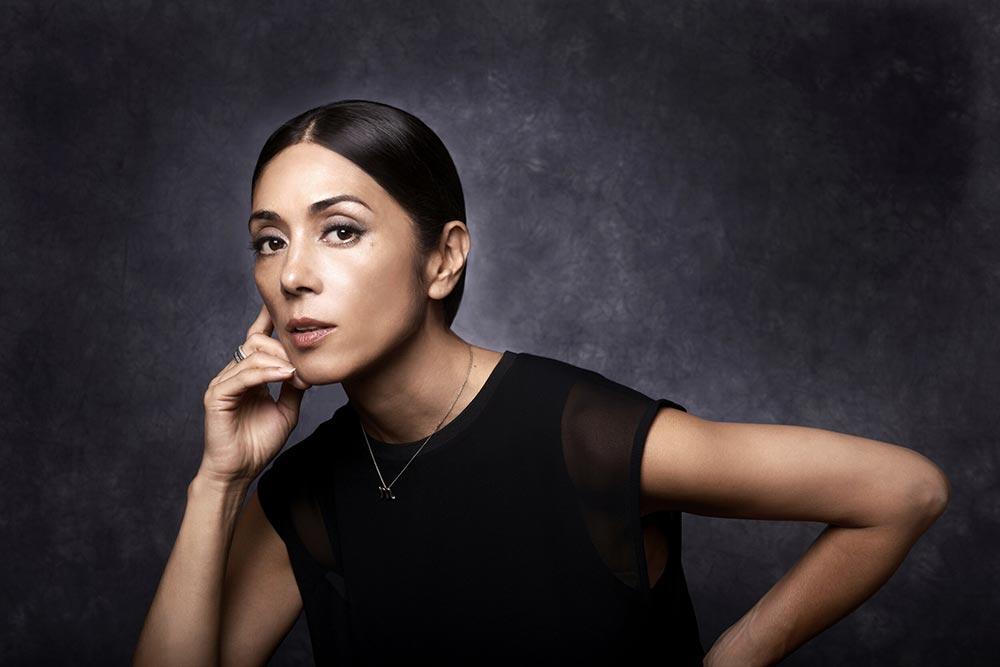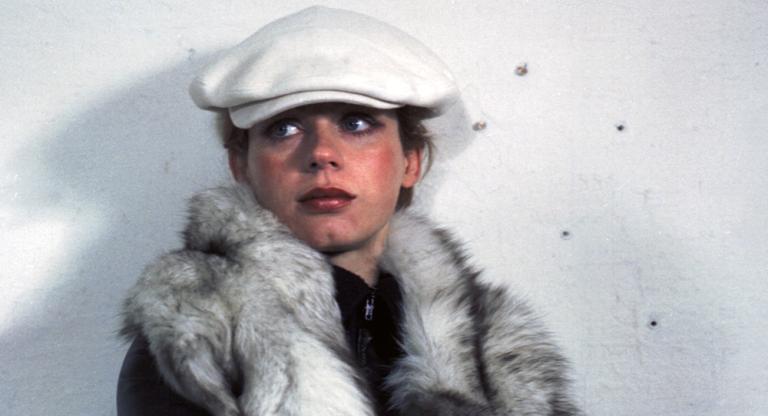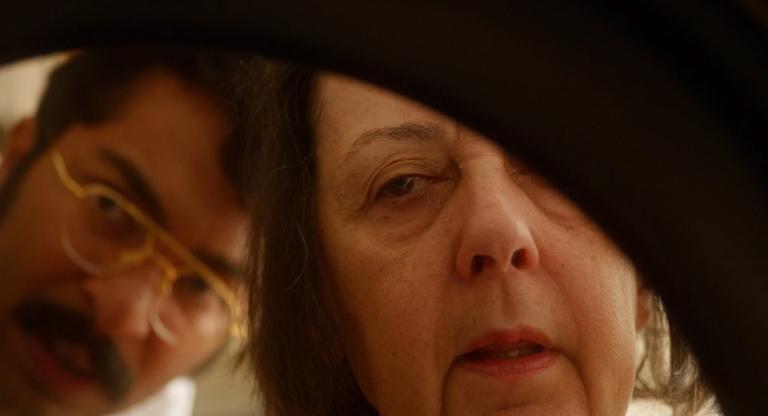Japan Society’s “Rites of Passage: The Films of Shinji Somai” serves as a belated introduction for New Yorkers to one of cinema’s most extraordinary stylists. One of his jewels—in a crown full of them—is Luminous Woman (1987), the urban odyssey of a mountain man in Tokyo, where he finds himself forced into gladiatorial combat and falling in love with a radiant opera singer.
That luminous woman is played by world-renowned musician Monday Michiru, who will also introduce the film’s May 5 screening. The daughter of jazz legends Toshiko Akiyoshi and Charlie Mariano, Monday helped pioneer Japanese acid jazz, alongside collaborators such as Mondo Grosso and DJ Krush. Her latest album, last year’s Enso, continues a lifelong tradition of innovation. We had a conversation about the beginning of her career and her surprising detour into acting at the Kitano Hotel, one of many venues she has played regularly in New York.
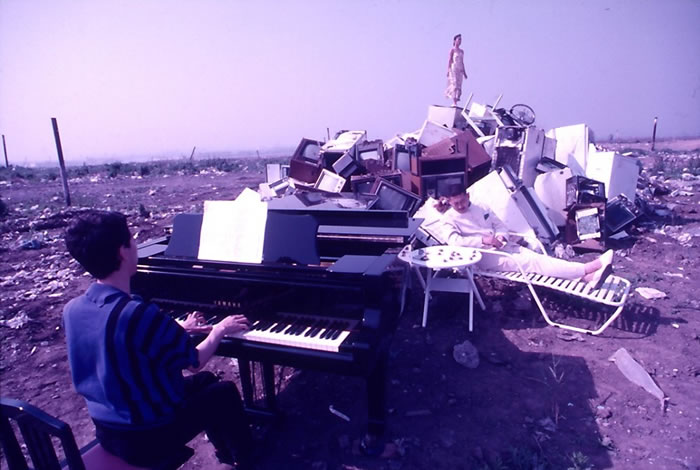
Bingham Bryant: So, it's 1986 or 1987. You'd already been back and forth between Japan and the U.S. a few times.
Monday Michiru: I was born in Japan, but at the time I was living in Los Angeles, and I was working at a film distribution company. Among our clients were the Japanese—I think it was Shochiku. They all really liked me because of my mother and because I spoke Japanese. So they thought, “Oh, it's so cute she speaks Japanese to us!" And they invited me one time for dinner, and amongst them was a lyricist, Yoko Aki. She was the one who was like, “I'll help you.”
I was looking to get a recording situation in Japan and I had already been talking with producers about it, so my name and pictures were already floating around in the Japanese circuit. Coincidentally, probably a year before, I had gotten a cold call from this woman saying, "Hi, your picture and name came up for this film. We wondered if you would be interested in it." And I'm like, "I'm not an actress. Why are you calling me? And is there nudity involved?” When she said, "Yes," I thought, "Ah!" Being a hāfu [a term for people with one ethnic Japanese and one non-ethnic Japanese parent –Ed.], at that time, it immediately opened you up for potential weirdness, ickiness, which I really wanted to stay away from. So I just said, “Thank you, no thank you,” bam.
Yoko Aki gave my demo tape and picture to this man who headed his own management and film production company. The name of the company was Kitty Films, and the man's name was Taga-san [Hidenori Taga]. He happened to be one of the producers for Hikaru onna, aka Luminous Woman, and he gave my picture and whatnot to Somai-san, who wanted me to come do the audition. So I get yet another call saying "Hi, blah blah.” It wasn't until later that I made the connection that it was the same movie that they had cold-called me for.
Somai-san always wanted to work with amateurs who had never had film acting experience. I fit that bill. And he was looking specifically for someone with classical music training, a singer. I was a singer with classical music training in flute. That was good enough for him. [laughs] So once I went for the audition, I got the role and it was like bim-bam-boom, because they had already been in production filming for eight months without a lead.
BB: Really?
MM: Yes.
BB: With your co-star Keiji Mutoh?
MM: With Mutoh. They were solidly in there, and I was like, “Hi! I don't know how to act! My Japanese is a little wanting these days!” I was thrown straight in.
BB: After eight months Mutoh must have already been a trained professional, even though he came in as amateur as you! You got along?
MM: He is a wonderful guy. He comes once in a while to the States, because he's now the head of his own pro-wrestling dojo.
BB: So how long was the shoot altogether?
MM: By the time I got in it was March, and we wrapped up in May. So I was in there for only a couple of months. Again, it was already filming for those seven, eight, nine months.
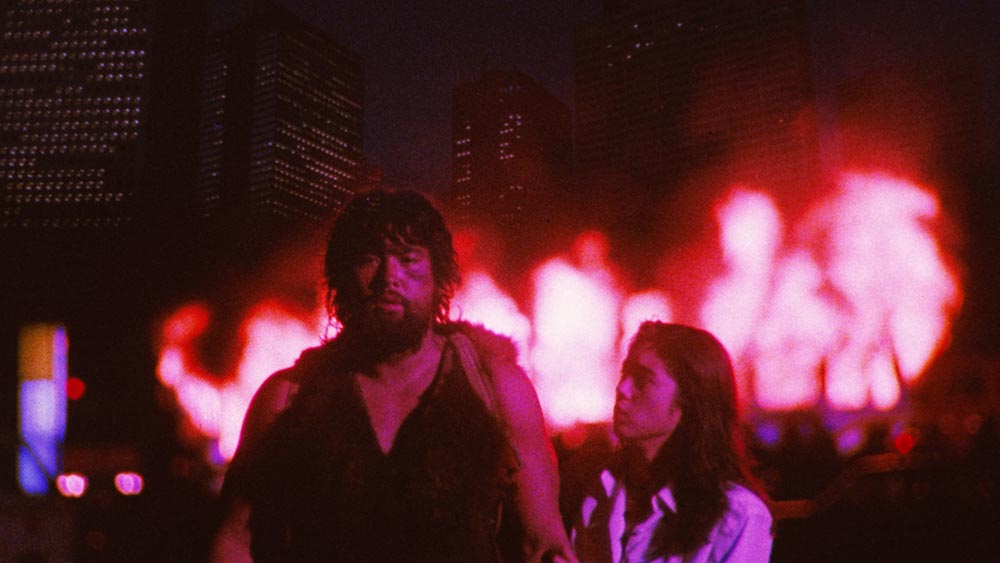
BB: But you're in as much of the film as Mutoh is . . .
MM: At that point, almost all the other scenes were shot. And I honestly think it was desperation that won me the role more than anything. I don't think there was much else. "Just get her!"
BB: The film is kind of about being an outsider in the big city and how that affects you, how Tokyo chews people up. Mutoh plays an Ainu [Indigenous people of Northern Japan –Ed.] from Hokkaido. I wonder whether they were looking for someone else who was an outsider in some way as well?
MM: I honestly don't know. Somai-san was a very private guy, very quiet. He didn't really share a lot of thoughts with me. As you can see, I'm a very bright and upper type of character, whereas the character is very much the opposite of that. So he always called me “the fool.”
Myself and Mutoh-san and an assistant director stayed together at the assistant director's house. The assistant director was always responsible for making sure we got onto set on time and everything. When we came in, the director coined us the san baka torio: three stupid trio.
BB: I hope that was affectionate.
MM: Oh, everything was extremely jokingly said—with a hint of sarcasm and meaning behind it. [laughs] I say this with love. I have a soft spot for, as we call them, ganko oyaji. Ganko means very stubborn, set-in their ways; oyaji is an older man. He was already in his forties at the time, so for me an older man, and he was very much that stubborn, he-will-not bend-in-his-ways type. I have a soft spot for people like that, so he could have hurled any amount of insults at me, and I would have received it with glee.
BB: What was his process like with the actors, in the context of these very elaborate long takes?
MM: I would say that he gave very little direction in terms of acting in a certain way. We had to figure it out ourselves. The scenes were long, and they were never one-takes. They would be as much as a dozen takes, sometimes more, very few times less. And so each time it would be "Cut!" and then "We're going again," there was the feeling of, OK, I did something wrong, what was it, figure it out. And so we were left to our own devices in that way.
BB: But I also feel that his actors have been given puzzles to solve, games to play in these shots, and they are figuring it out. Was there a fun, an enjoyment to problem-solving?
MM: I was a 23-year-old young woman, thrown into a world that I didn't understand. My Japanese wasn't 100%. Even though I'm half-Japanese and was born in Japan and lived there in my youth for a little bit, it was the first time that I was living back in Japan. It was a lot for me to try and grapple with. So the idea of "This is fun" and, "I'm being given a chance to explore this"—yeah, it's in there, but it was amongst a myriad of things that I had to figure out. It was extremely stressful.
BB: There's a really lovely melancholy to your performance. It's not anxious or stressful.
MM: Oh, no! He would never have allowed that. We were going through repetitions of the scene over and over again. Through the repetition, it starts to become natural, it starts to become almost automatic, it starts to become you're not thinking about the lines and how you should be feeling, you just zone into it. He was looking for that.
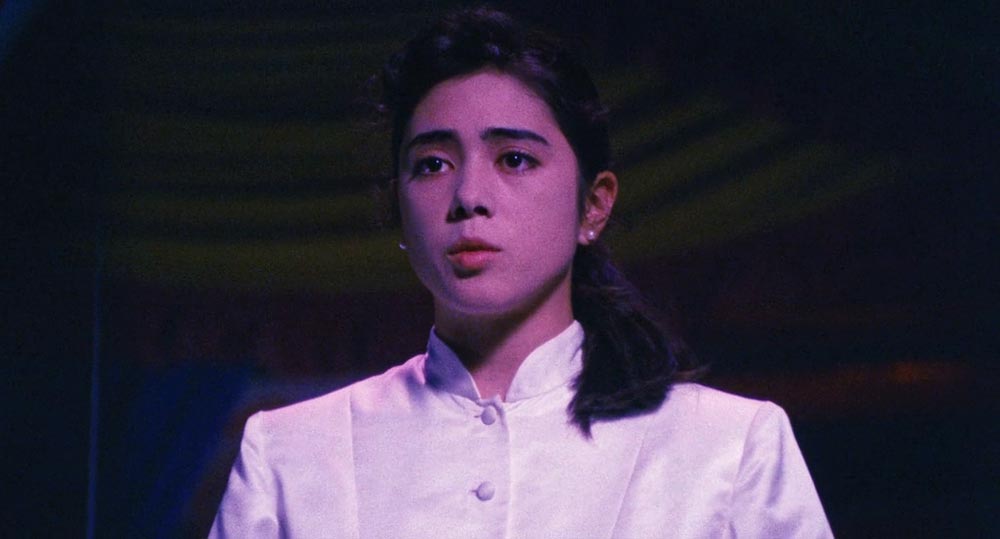
BB: I get the sense that he wanted non-professionals in part because they wouldn't be coming with so much discipline about appearance, presentation.
MM: I think so, and also, having lived in Japan during that time and watching TV and the movies, I saw that there was, like I'm sure in any culture, a certain expectation of how you should act—affected, not very natural. I think he wanted to get amateurs to get as much of a natural reaction to things, rather than schooled, [as possible].
BB: There are some very complicated shots. Do you recall that being something you were invited to understand, or was it confusing?
MM: No confusion. I just took it as, Oh, cool. [laughs] I didn't really think too hard about it. My focus was: I hope I do this OK. I noticed it, I thought it was cool, and I just focused.
BB: The film premiered at the first Tokyo International Film Festival, where it won the Young Cinema Award. And then you won Kinema Junpo, Japan Academy, and Yokohama Film Festival prizes for Best New Actress.
MM: Because I was coming into it as such an outsider, my take on it was that it was more about Somai-san than me. I was the symbol of “OK, you're the newcomer, so you're getting these awards.” Don't get me wrong, it was incredibly flattering to get those. But I didn't really feel that I had earned it.
BB: Do you know if Luminous Woman ever played in New York?
MM: Yes, and the only reason I know this is because I happened to be in New York visiting my parents. My parents have lived here again since 1982, so when I would leave Japan for little visits to America I would go to L.A. and I would go to New York. During one of my visits I went to see something at Lincoln Center and I was in the plaza. Two young guys came up to me like, “You're her, Luminous Woman.” I'm like, “What?” That was the first time I found out that it had been shown, probably at one of the foreign film festivals, and that the English name was Luminous Woman.
BB: Did you keep in touch with Somai at all?
MM: No. I guess only because he never offered me his number or anything like that. It would have been not-cool of me to say, "Hey, I'm gonna call you. Let's go out for dinner.” You don't do that as an actress to a great director. So I kept my respectful distance. But when I would run into him, we used to—I had a running joke with him, because he was forever a bachelor: “If, by 40 or 50, whatever, if you're not married, I'll marry you.” As a joke.
He was ill of health even back then. I'm not going to get into it, because I'm not going to get into personal stuff, but he was frail.
BB: Did you want to continue with acting, or was it just something that happened for a while?
MM: It was something that happened. My whole logic behind taking this role, other than for the adventure, was to be able to eventually reroute my efforts into music, which is really where my foundations lay. Because the management/film company was also a recording company, I thought, "Oh, this is perfect. I'm going to get in there." So I kept sort of nudging my manager, like, "Listen, it's great that I'm being thrown into doing all this stuff, but . . . you know I'm a singer." The first time I said that to him, he was a little shocked and sort of grumbling to himself. His whole role was to try and push me as an actress, and that's what he did.
BB: But then the films you did make are for very interesting directors. Maybe you just had good taste, but you were not choosing the most commercial projects.
MM: Frankly, these were not my choices. They were choices made by my manager, so kudos to him for choosing well.
BB: Can you tell me about working with Kaizo Hayashi?
MM: I met Kaizo at that Tokyo International Film Festival. He had debuted his first film.
BB: To Sleep So as to Dream? [1986]
MM: I believe so. He approached me and said, "Hey, you know, loved your film." That sort of thing. Kaizo is a really funny guy. This sounds negative, it's not meant to be, but he worms his way into hanging with people. And I became one of a bunch of people that he would call and say, "I'm at this bar, come." He was a load of fun and quite a night owl. So it was through our hangs. He's like, "I want you to be in this film." He had me in two of his films: Zipang [1990] and the one before that, Circus Boys [1989].
I remember on the circus one, I was super pissed off. [laughs] He had no budget, he paid nothing, which is not the point at all, because I was on salary from the management company. But when I found out, I was like, “Wow, he's really taking advantage of his friendships with people to hire us, but OK, that's Kaizo's way.” But then I was supposed to be a trapeze artist and he only gave me a half-hour lesson before I was suddenly expected to perform. I'm like, “What does he expect my physical abilities to be?” I could barely do a pushup. He was angry with me that I couldn't do the swing and get back onto the platform! And I was fearful of heights! So, Kaizo was a hoot to work with—and I'm being kind by saying that. I say this with love: he's a good guy, but his professionalism as a director and responsibility as such was a little wanting.
BB: From the films you do get the impression of someone who is in a bit of a fantasy world.
MM: Extremely fantasy world.
BB: And then you worked with Koji Wakamatsu in Australia on Singapore Sling [1993], which is probably your most dramatic role.
MM: Traumatic or dramatic?
BB: Could have been both! But I meant dramatic.
MM: You know, being that my first director I got to work with was Somai, it was all I had to compare with. I'll say it, and I don't mean this as a disrespect to the other directors, but none compared to Somai. Somai was a fantastic, fantastic man to be directed by.
I said just minutes ago that he doesn't really direct; he expected us to figure it out. That kind of directing is really amazing and valuable. It allows one to really hone in on a character and what's going on in that scene. First it's cerebral, you're thinking it through, and then later your body just instinctually starts to get into whatever mode it's supposed to get into. That luxury doesn't exist in the real filming world, as I discovered afterwards. In Japan—I don't know how it is in America or elsewhere. But I found that to be really hard for me, once I was thrown into other filming and acting situations.
BB: I think it's a rare thing everywhere. And it means that the characters and the performances in his films do stand out. Even when the camera is a million miles away and doing these crazy loop-de-loops, you have a real sense of them as people and characters.
MM: What is your favorite film by him?
BB: I love P. P. Rider [1983].
MM: I think that's one of the ones I haven't seen.
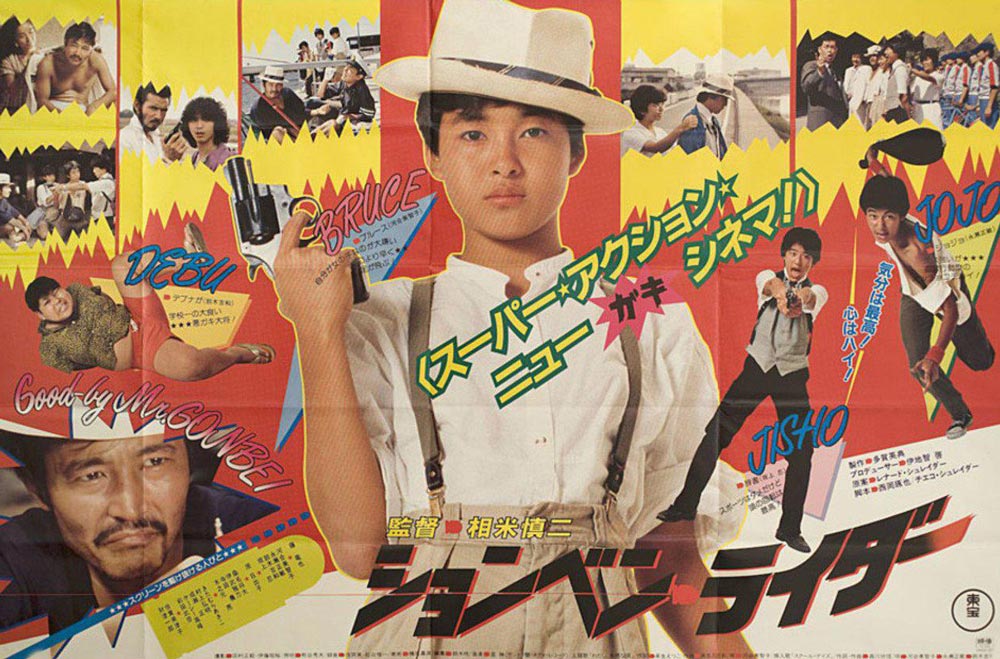
BB: That's the most loose and athletic, the one where it feels his style is at its height. Luminous Woman is, I think, another apex of his style, but in a different direction—it's more theatrical and has this fantastical side. P. P. Rider is really just about people running and jumping and swimming and falling all over the place, and that is very unique to him. I love that and I love The Catch [1983].
MM: Oh my God, that's my favorite.
BB: Isn't it incredible?
MM: I remember I thought, "If I'm going to work with this guy, I need to see what he's done." I already knew at that point that there was nudity involved, and I needed to make sure that I was working with a serious director, not with someone who was like, "Oh, it's a hāfu. Let's get her naked.” So I saw Typhoon Club [1985], I saw another one, I saw The Catch. And The Catch convinced me, like, "Shit”—excuse my language—“I must work with him. If I'm going to be doing this, this is the guy to work with. If he can get that kind of intensity . . . ” I get emotional just thinking about how great that film is.
BB: But you did manage to find a proper record deal eventually.
MM: Eventually, yeah. I stayed in Japan until 2000. It took a while. They were hearing what I was saying—I think they were just trying to figure it out. They threw me little bones, like I got to write and sing for a couple animes. And then they had me trying to help a couple of their Japanese acts, to write lyrics in English and stuff like that. I just sort of kept pressing and pressing.
BB: You made your first album under the name Michiru Akiyoshi?
MM: Yeah, it was again sort of a given to them, because I was more known as Michiru Akiyoshi. They were hoping to cash in on that name. But it was a failure. I think it barely sold maybe two, three, four thousand. Something like that. Which in this day would be huge, but . . .
BB: True. It's a very interesting album, which has resurfaced on the internet a little bit.
MM: Really? Isn't that weird. Everything always comes back.
BB: And your most recent album is Enso. That was last year.
MM: Yeah. Enso is an album that was made because I was hoping to be orchestrated. Gil Goldstein, who's a wonderful producer and arranger, was going to do it. We had talks with a major record label in Japan—then the pandemic. During the pandemic, I applied for the U.S. small business loan and got it, and that allowed me to make the album, not quite to the extent that I was hoping for, with a full orchestration, but still, I'm really happy with the way it came out. Enso means cycle, the full circle. In retrospect, maybe I should have released it this year because this is my kanreki: the 60th birthday, the full cycle.
BB: Well, we'll listen to it this year. You're going to be playing New York next in August?
“Rites of Passage: The Films of Shinji Somai” runs through May 13 at Japan Society. Luminous Woman screens May 5 and 13 in a new digital restoration.
